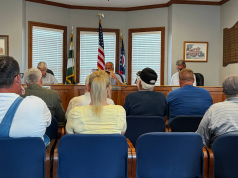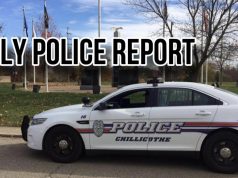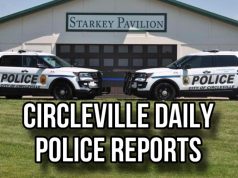Brad Cotton
Sitting this evening with the other “Dance-Moms” or “Dance-Dads,” or, in my case, “Dance-Pop-Pops” at Gracie’s class at the Charmion Performing Arts Center, I had one of those moments when we know that “we read books so that we know we are not alone.”
I finished the chapter on “Compassion” in our Progressive Christianity class study guide “Living the Questions.” Anthropologist Margaret Mead, when asked what archaeological signs portend that a band of primates-becoming-men has become civilized answered that finding healed femur fractures is the surest sign.
Meade elucidated that the degree of compassion in said primal band, or among advanced modern societies, is the best marker of civilization. A healed femur fracture is proof that the band hunted and gathered for and fed this injured member for weeks while the bones knit together, to be discovered tens of thousands of years later as proof of compassion, and of civilization as being one and the same.
Gracie called me in, they called all “Dance-whatever-parental-units” in to watch. Gracie’s class was practicing for their recital, tap dancing to the theme from the 60s “Petticoat Junction.” I volunteered to be “there’s Uncle Joe, he’s a movin’ kinda slow” at the June recital to the studio owner/instructor. Gracie said, “You embarrass me, Pop-Pop.” Guess I’m doing a good job.
Sarah’s sister helped her dance. Sarah is blind but her face is bright, her feet keeping time with the other tappers. Her sister is patient and thorough. Sitting with other “Dance-parental units,” I look at them. What secret scars do they and their families bear? Are they as Hemingway said, “strong in the broken places?” Am I aware of the hurts my wife, children and grandchildren bear?
I think of all those compassionate to me. My high school English teacher who commented on my essay about The Beatles tune “I am the Walrus,” both complimenting my writing and wondering if I truly felt that badly about the world. The answer is yes, but working in the ER I feel I am doing something about it. Dick McNett pulled out a chair for me in a church basement so long ago. All compassionate deeds live, in this manner Dick writes to you today.
Then there were the paramedic instructors, nursing and medical school professors who urged me on. If I succeeded, it was not my victory, it was their victory. It takes a village.
One funny, then wrap-up. Kent State Nursing instructor Clare N–complimented me on my care of laboring ladies: “Brad, have you worked in OB before? You are very good with dealing with labor coaching.” By this time I had already had several years of EMS on the street and working nights in the ER.
“Ms. N—, no, but I have worked a lot of nights in the ER.”
Ms. N—asked how that applied here.
“Ms N—-, all those drunks, crazies and overdoses–their mental status was about the same as these women in labor; you dealt with one, you deal with them all.”
Ms. N–relented that although she would have to give me an “A,” it bothered her.
Regarding Mead’s anthropological assessment of care of a femur fracture defining compassion and thus the degree of civilization of a society, I wonder what Mead would say about US health care? Here, if you have a broken femur, you’d better have good insurance or be prepared to declare bankruptcy. For many jobs, you won’t get sick pay. Capitalism pits one against the other, we have no neighbors in the sense that Jesus meant, we only have market competitors. Capitalism is all about “me,” humanity and civilization is about “we.” It takes a village.
Picket and Wilkinson’s book “The Spirit Level: Why Greater Equality Makes Societies Stronger,” expertly and scientifically researched, compares multiple nations across the world. Societies in which there are very rich and very poor, as in the US today, fare worse on measures of health care, depression, suicide, murder and measures of happiness. This is true within the US, comparing the most unequal states (Mississippi and many deep southern states) with other more egalitarian states. More fair societies, with fairer rewards for work, fairer access to health care and education are happier and more compassionate societies, with more altruistic expressions of humanity, one for the other.
Seems it takes a village for us to live fully.
This article originally appeared on The Pickaway News Journal










